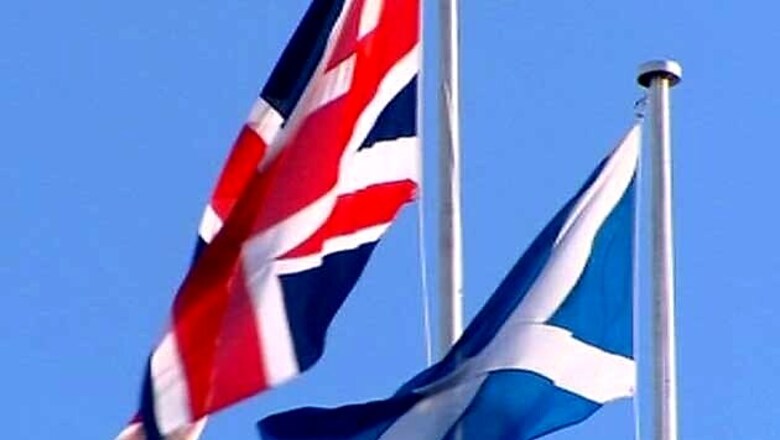
views
London: Will the United Kingdom or Great Britain survive as one nation? It depends on the people of Scotland. Scotland is voting on Thursday to decide whether it should continue to be a part of the British Empire or whether it should declare independence. The world attention is on the people of Scotland who not only decide the fate of Scotland, but also the future of United Kingdom.
The list of those who are eligible to vote in the referendum is almost the same as for elections to the Scottish Parliament and local authorities, but with the addition of 16 and 17 year olds.
The following groups of people can register to vote in the referendum:
- British citizens resident in Scotland.
- Qualifying Commonwealth citizens resident in Scotland. This means Commonwealth citizens who either have leave to remain in the UK or do not require such leave, and are resident in Scotland.
- Citizens of the Republic of Ireland and other EU countries resident in Scotland.
- Members of the House of Lords resident in Scotland.
- Service/Crown personnel serving in the UK or overseas in the Armed Forces or with Her Majesty's Government who are registered to vote in Scotland.
All previous referendums have decisively voted against Scottish independence. This time, the situation appears to be different and several opinion polls have predicted a tight race.
A shaken UK government in London has promised more powers to Scotland, if votes against separation. The British Prime Minister David Cameroon made a very strong statement at Aberdeen in Scotland on Monday that if the Scottish people want separation; it will be a very 'painful' divorce and won't be mutual courtroom separation.
Even Queen Elizabeth II has also spoken for the first time about the referendum. According to British media, the Queen said that the people of Scotland would think very very carefully before voting.
The public opinion is sharply divided among the Scottish people. Lot of people want Scotland to become a republic and the Queen Elizabeth II should be the last monarch of United Kingdom, which includes Scotland, England, Wales and Northern Ireland.
Background
Around a third of Scotland's 4 million voters believe that Scotland should leave the UK and become independent, ending the 305-year-old political union with England. They believe Scotland's economy, its social policies and its creativity would flourish if it had much greater autonomy. A majority of Scots disagree. They believe Scotland is more secure within the UK, but many want the Scottish parliament to have greater financial and legal powers.
According to 'Guardian', Scotland's relations with its larger neighbour have often been difficult, none more so than in the "wars of independence" 700 years ago led by William Wallace and then Robert the Bruce. He defeated Edward II, then attempting to subjugate Scotland, at Bannockburn in 1314. After other cross border disputes, including Scotland's defeat at Flodden by the English in 1513, the Scottish and English crowns were unified in 1603 when King James VI of Scotland became overall monarch of the British isles.
In 1707, that union was cemented by Scotland and England's political union, forced on Scotland in part by a financial crisis following the abject failure of its colony in Panama, the so-called Darien adventure. All political power moved to London, but Scotland retained its own legal system, churches and universities. In 1745, the pretender to the British throne, Bonnie Prince Charlie, led the Jacobite revolt against Hanoverian rule by London. Despite reaching as far south as Derby, that ended in crushing defeat at Culloden in 1746.
In the 1800s, Scotland's economy strengthened, its cities boomed and its citizens took a leading role in the British empire. But proposals to give Scotland some form of "home rule" within the UK have been live since William Gladstone's era as Liberal leader in the 1880s. After several failed attempts at Westminster, notably in 1913 and 1979, a Scottish parliament was finally reestablished in 1999 in Edinburgh with wide-ranging policy making and legal powers but dependent on a direct grant from London.
In May 2011, Salmond and the SNP unexpectedly won an historic landslide victory giving the nationalists majority control of the Scottish parliament, enabling the first minister to demand that independence referendum.
What is Scotland?
Scotland, with little more than 5 million people, is one of the oldest countries in the world, having been united as a single nation by King Kenneth MacAlpin in the year 843.
It remained an independent state for more than 800 years until the formation of Great Britain in 1707.
When England found itself at war with France in the early 18th century, fears that Scotland would side with the enemy prompted London to block trade and deprive Scots of property they owned south of the border unless they agreed to create a single country.
After much debate - and widespread Scottish hostility - both the Scottish and English parliaments were dissolved on May 1, 1707 and replaced with a new British one.
How is Scotland different from the rest of the United Kingdom?
Scotland has its own legal system, and the national Church of Scotland was guaranteed under the Act of Union.
However, all monetary and finance matters are controlled by the government in London and the Bank of England, which was founded by Scotsman William Paterson in 1694.
Doesn't Scotland already have its own parliament?
A desire for more autonomy in Scotland led to Westminster holding a referendum in 1997 for the establishment of a devolved Scottish Parliament in Edinburgh.
The idea was backed by 74 per cent of the voters and in 1999 the parliament was opened for business by veteran politician Winnie Ewing, who chaired the first meeting, with the words. "The Scottish Parliament adjourned on the 25th day of March in the year 1707 is hereby reconvened."
Members of the Scottish Parliament can legislate on education, health spending, housing, tourism, transport and a few other areas; they have no control over immigration, defense, foreign policy, employment, trade, energy or the main levers of finance.
Most of the money used by the Scottish Parliament to finance public services comes from a grant allocated by the United Kingdom government.
What are Scotland's economic strengths?
The UK produces more than 75 per cent of the European Union's offshore oil production, of which 90 percent is extracted from Scottish waters, according to the European Commission's Joint Research Centre. Based on 2012 figures, the Scottish government says this Scottish oil contributes around £24.4 billion to the UK economy.
In addition to oil, the Scottish government calculates the country could produce 25 percent of the EU's offshore wind and tidal energy and 10 percent of the EU's wave energy.
Scottish exports are worth around £100 billion year to the British Treasury, including including more than £11 billion from financial services, along with almost £9 billion from food and drink, including whisky.
What have the Scots given the world?
Scotland's influence has been out of proportion to its size.
The Declaration of Arbroath, asserting Scottish independence in 1320, influenced the American Declaration of Independence. A rare copy of the Scottish manuscript was given to the US National Archives by the Scottish government in 2011 in appreciation of the US Senate passing a resolution designating every April 6 as Tartan Day in the United States.
Over the centuries Scottish engineers, inventors, thinkers and business people helped create the modern world. James Watt helped develop the practical steam engine, Sir Alexander Fleming discovered penicillin, John Logie Baird pioneered television and Alexander Graham Bell invented the telephone.
It was Englishman Winston Churchill who said, "Of all the small nations on earth, perhaps only the ancient Greeks surpass the Scots in their contribution to mankind."
####




















Comments
0 comment